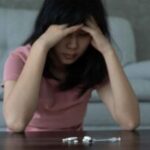By: Design for Change Recovery
Categories:
Dope Sick: What Does It Mean?
You are here:Have you heard the term “dope sick” and wondered what it means? Like most people, you may think it’s about a person who just wants more drugs. That interpretation is partly true, but for the people who go through dope sickness, it feels like sheer torment.
What happens when someone is dope sick to make them feel so miserable? A person who is addicted to heroin or other opioids will have uncomfortable physical and emotional withdrawal symptoms during periods of abstinence. Unfortunately, they think the only way to stop the discomfort is to seek more of the drug.
What Does It Feel Like to Be Dope Sick?
Part of being dope sick is the palpable fear of being dope sick. Many people genuinely want to quit using addictive substances, but the fear of withdrawals keeps them from trying. As they continue using the substance, their addiction gets stronger, and the withdrawal symptoms increase in severity. As a result, their fear of being dope sick also increases. It’s an endless cycle that is impossible to break without professional treatment.
The symptoms a person experiences during dope sickness can include:
- Aches and pain
- Nausea, vomiting, diarrhea
- Fatigue, insomnia, exhaustion
- Dehydration
- Tremors, seizures
Psychological symptoms:
- Confusion
- Mood swings
- Depression, suicidal thoughts
- Anxiety, aggression
- Frustration, hopelessness
The symptoms can be so uncomfortable that they interfere with a person’s normal functioning, preventing them from going to work or meeting other daily obligations. Typically, the symptoms are not life-threatening, but they can be severe enough to require medical intervention.
Anyone who is struggling with opioid addiction should not attempt to detox on their own. The risks to their health and safety are very real and should be closely monitored by skilled professionals.
Does Opioid Detox Cause a Person to Feel Dope Sick?
Detoxification is a process that facilitates cleansing the body of all traces of an addictive substance. It is the first step in addiction treatment, but it is not an immediate cure. Detox should be followed by a rehabilitation program and aftercare services to ensure the best outcome.
During opioid detox a person will go through three distinct stages of withdrawals:
Early Stage
During this stage, a person feels intense cravings for the substance. They become anxious, angry, and frustrated. The cravings gradually increase in intensity for several hours.
Peak Stage
This stage of withdrawal is the toughest. The cravings continue to escalate and last for a day or two longer. The individual begins to feel physically sick and extremely anxious.
Late Stage
When a person reaches this stage, their symptoms begin to decrease in intensity. But, physical symptoms can persist for about a week. The psychological cravings will also continue, but they will be less intense. People who have severe addictions may experience mild withdrawal symptoms for months or years.
Managing Dope Sickness With Medical Detox
The most effective way to get through opioid withdrawals is through medically supervised detox. Professional detox centers provide medical supervision 24/7 to ensure a person’s safety and comfort at all times.
During the detox process, skilled counselors and staff provide several individualized therapies to help the patient achieve their recovery goals. The therapies may include:
- Group and individual counseling
- Medication-assisted therapy (MAT)
- Cognitive-behavioral therapy (CBT)
- Dialectical behavior therapy (DBT)
- Dual-diagnosis treatment
- Family therapy
The goal of these therapies is to help a person gain improved coping skills and learn to identify triggers that may lead to relapse.
Feeling Dope Sick Is A Sign You Need Rehab
The severity of the addiction and the presence of mental or physical health problems will determine which level of care a person requires. Addiction specialists will conduct a confidential assessment and determine the best treatment approach for each person.
The different types of detox programs are:
- Outpatient
- Intensive Outpatient (IOP)
- Partial Hospitalization (PHP)
- Inpatient/Residential
Some people prefer the flexibility of outpatient treatment. They may not be able to commit to an inpatient, long-term program because of work or family obligations. Outpatient detox allows them to undergo treatment without major disruption to their daily routine or responsibilities. A disadvantage of outpatient programs is that the patient may be returning to a toxic environment every day after treatment, increasing their risk for relapse.
In most cases, an inpatient program is the recommended approach for people who are addicted to opioids, heroin, fentanyl, or alcohol. An inpatient facility provides a drug-free environment where patients remain day and night during treatment.
Qualified, Accredited Detox Programs at Design for Change Recovery
The only good thing about addiction is that it’s not permanent if you get the right treatment. Don’t let the fear of dope sickness prevent you from seeking help. At Design for Change Recovery, our compassionate, skilled professionals will be beside you every step of the way.
Learn more about our accredited, comprehensive addiction treatment programs today. Contact Design for Change Recovery at our Lancaster, CA facility to speak with one of our representatives. We are here to help you overcome addiction and live the fulfilling life you deserve.
Sources:
- ncbi.nlm.nih.gov – Strategies to Avoid Opiate Withdrawal: Implications for HCV and HIV Risks
- ncbi.nlm.nih.gov– Opioid Withdrawal



